- Home
- Search
- Nanaimo Single Family Homes
- Nanaimo Condos
- Nanaimo Multi-Family Homes
- Nanaimo Manufactured Homes
- Nanaimo Vacant Land
- Nanaimo Mountian Views
- Nanaimo Ocean Views
- Nanaimo Ocean View Condos
- Nanaimo Waterfront Homes
- Nanaimo Income Properties
- Nanaimo Homes Under $750,000
- Nanaimo Homes Under $650,000
- Nanaimo Homes Under $550,000
- Nanaimo Foreclosures
- Nanaimo Price Reductions
- Nanaimo Sales
- Nanaimo Open Houses
- Communities
- Sell
- Buy
- Resources
- About
-
- Register
- Sign In
- Agent Emailjohn@johncooper.ca
- Agent Phone+1(250) 619-9207
Real Estate Education:
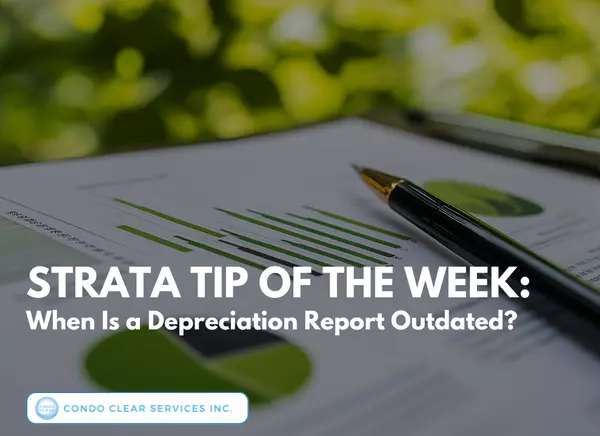
Strata Tip of the Week – When Is a Depreciation Report Outdated?
A depreciation report can become outdated far sooner than many people expect. In some cases, information in the report may begin to lose accuracy only a year or two after the report is completed. The answer depends on how well the report’s assumptions still match real-world conditions, and how much
Read More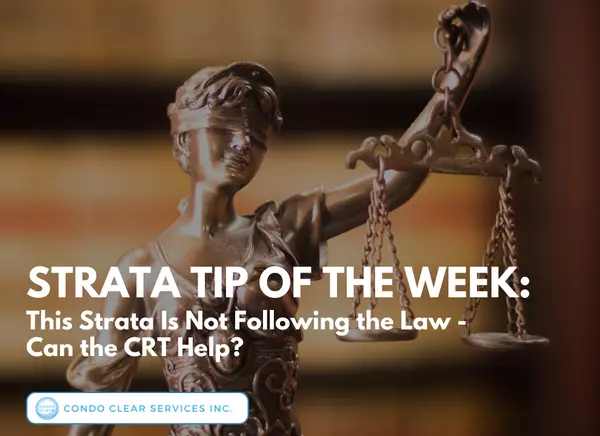
Strata Tip of the Week – This Strata Is Not Following the Law: Can the CRT Help?
Strata corporations in British Columbia operate within a fairly complex legal framework. While the Strata Property Act is the primary legislation governing how stratas are created, managed, and governed, it’s not the only law that applies. Depending on the issue, strata corporations may also need to
Read More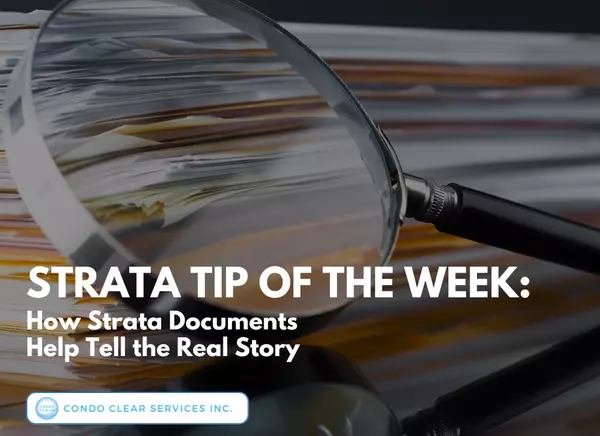
Strata Tip of the Week – How Strata Documents Help Tell the Real Story
When you buy a strata property, you’re not just buying the unit. You are also buying into the finances, maintenance history, governance, and long-term planning of the entire strata corporation. And a significant part of that story is reflected in the strata’s documents. At Condo Clear, we’ve reviewe
Read More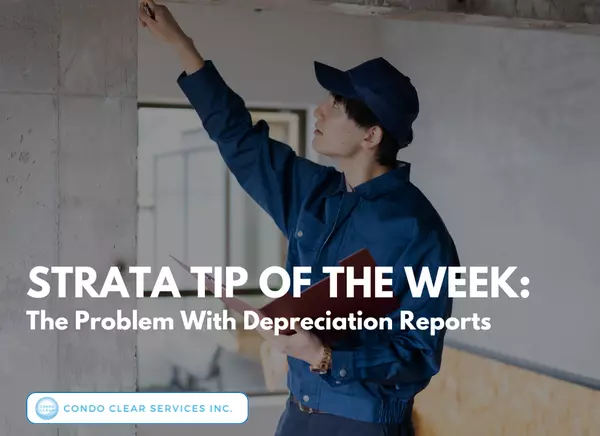
Strata Tip of the Week – The Problem With Depreciation Reports
As of July 1, 2024, strata corporations in BC with five or more strata lots must obtain a depreciation report and update it every five years. While the five-year update requirement now applies across the province, the timelines for when existing stratas must obtain or update their next report vary d
Read More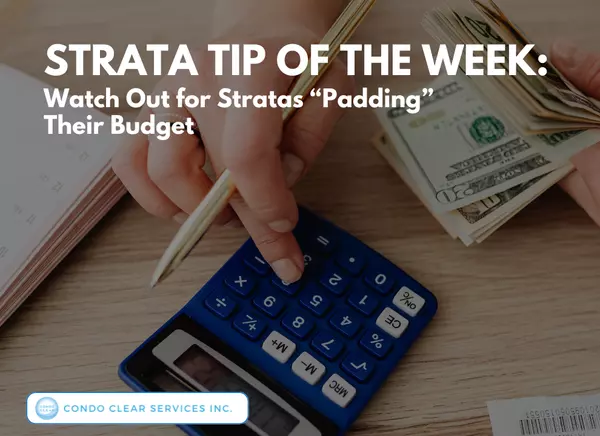
Strata Tip of the Week – Watch Out for Stratas “Padding” Their Budget
Many strata corporations place a lot of emphasis on keeping strata fees low. While this is often a reasonable goal, it’s important to understand how stratas achieve it and how using existing savings to avoid fee increases can affect owners over the long-term. What Are Strata Surpluses and Deficits?
Read More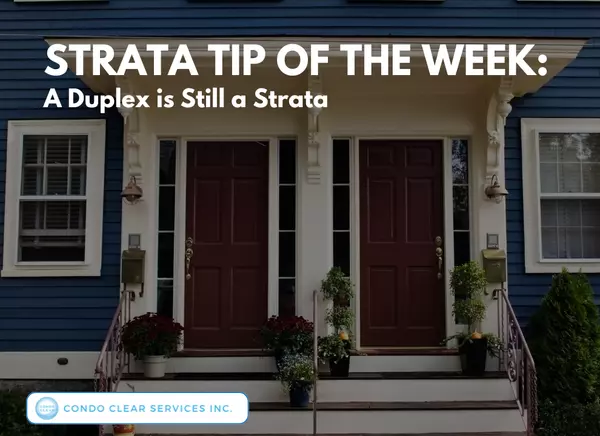
Strata Tip of the Week – A Duplex is Still a Strata
Many owners and buyers are surprised to learn that most duplexes in British Columbia are actually strata properties. The distinction comes down to how the property is registered at the Land Title Office. If the property was created under a strata plan, it is legally a strata corporation, regardless
Read More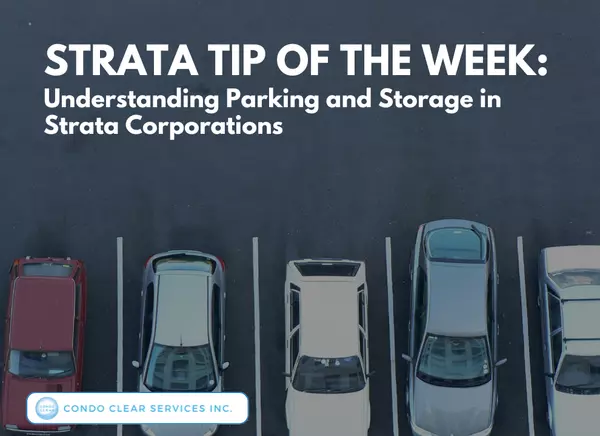
Strata Tip of the Week – Understanding Parking and Storage in Strata Corporations
Parking and storage are often important features of strata living. Who gets parking stalls or storage lockers, how they are assigned, and whether those rights can change all depend on how those components are designated and how the strata corporation manages and allocates them. Because parking and s
Read More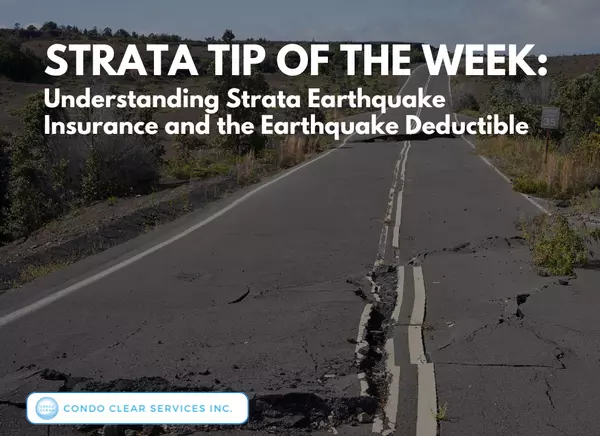
Strata Tip of the Week – Understanding Strata Earthquake Insurance and the Earthquake Deductible
A lot of buyers, and even strata owners, are surprised to learn that under the Strata Property Regulation, earthquake insurance is not considered a major peril. This means strata corporations in British Columbia are not required to obtain earthquake insurance, even though the province is considered
Read More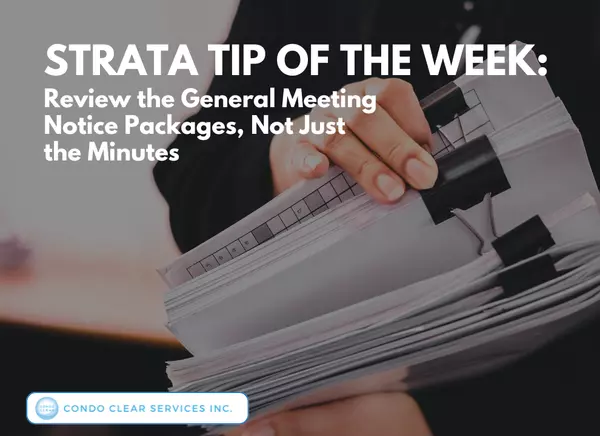
Strata Tip of the Week – Review the General Meeting Notice Packages, Not Just the Minutes
One pushback buyers and Realtors often get from strata corporations or management companies when requesting strata documents is about the AGM and SGM notice packages. They are sometimes told the packages: Are not available Not provided to buyers, or That everything in the packages is already covered
Read More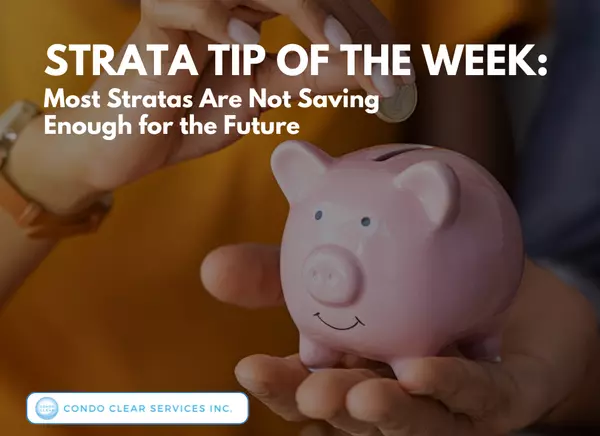
Strata Tip of the Week – Most Stratas Are Not Saving Enough for the Future
When buyers and owners look at the expenses that come with strata living, it’s natural to focus on unit prices and monthly strata fees. But what those fees don’t always reveal is whether the strata is setting aside enough in its contingency reserve fund (CRF) to pay for major repairs and replacement
Read More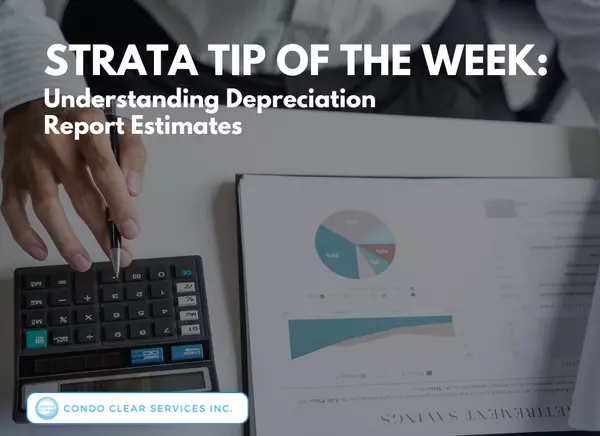
Strata Tip of the Week – Understanding Depreciation Report Estimates
Depreciation reports, as they’re known in BC, or reserve fund studies, as they’re known in many other jurisdictions, help strata corporations plan for the maintenance, repair, and replacement of common property and assets. From a buyer or owner’s perspective, these reports provide insight into: The
Read More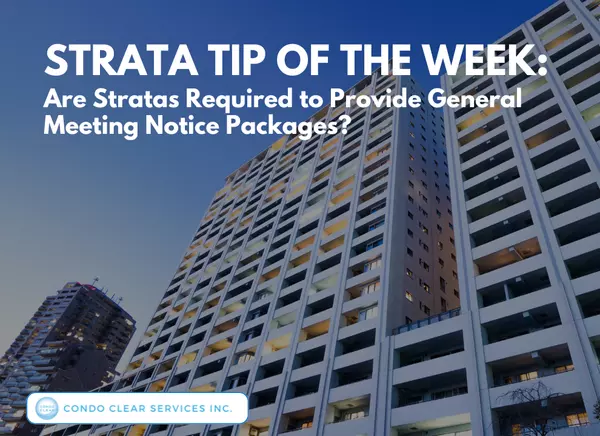
Strata Tip of the Week – Are Stratas Required to Provide General Meeting Notice Packages?
If you’ve worked with Condo Clear before, you’ll know that in addition to reviewing the general meeting minutes, we also recommend that you obtain and review the general meeting notice packages, as they often contain important information not included anywhere else. 1. So, is the strata corporation
Read More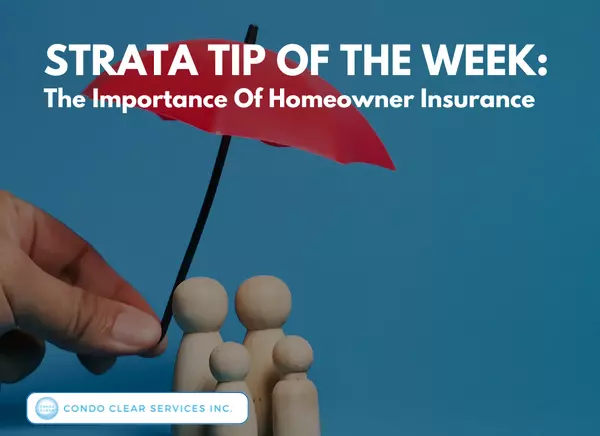
Strata Tip of the Week – The Importance Of Homeowner Insurance
When buying into a strata corporation, many consumers assume that the strata’s insurance will fully protect them in the event of a loss. In reality, strata insurance has limitations and deductibles that can leave owners with significant out-of-pocket expenses unless they also carry their own homeown
Read More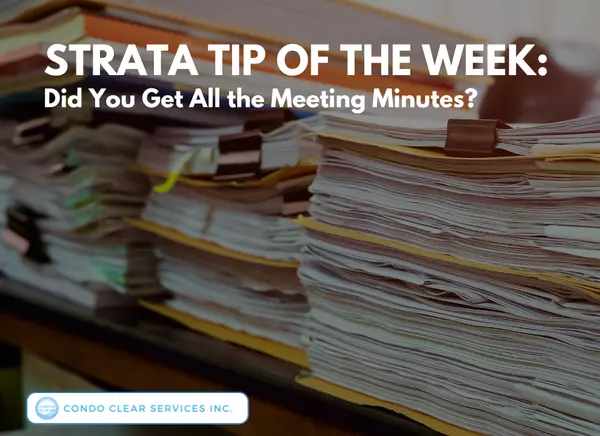
Strata Tip of the Week - Did You Get All the Meeting Minutes?
Missing meeting minutes are one of the most common issues we run into when reviewing strata documents. To help avoid this, here’s a simple five-step process you can follow to check whether you’ve received them all. Step 1: Separate the council meeting minutes from the general meeting minutes (AGMs a
Read More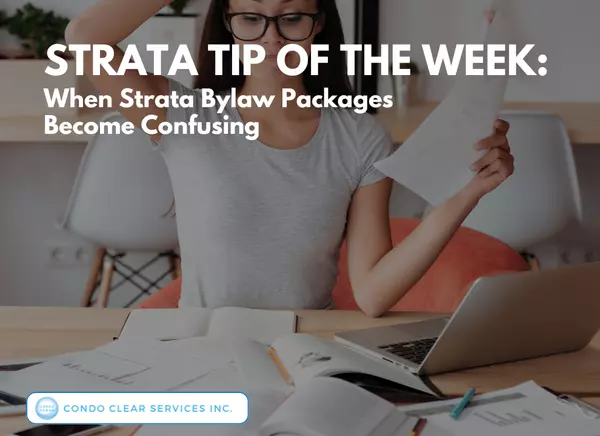
Strata Tip of the Week - When Strata Bylaw Packages Become Confusing
Bylaws are one of the most important documents in any strata corporation, but reviewing them isn’t always straightforward. Some bylaw packages are clear and easy to follow, while others can be a confusing mix of originals and multiple layers of amendments. This week, we’re looking at why some bylaw
Read More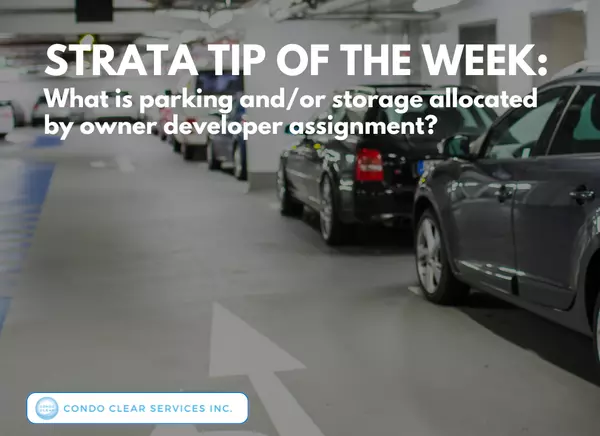
Strata Tip of the Week - What is parking and/or storage allocated by owner developer assignment?
If you’ve read our email titled Understanding Parking and Storage Designations, you’ll know that there are different ways parking and storage can be designated within a strata corporation. One of these is when parking and/or storage has been allocated by owner developer assignment. You’ll typically
Read More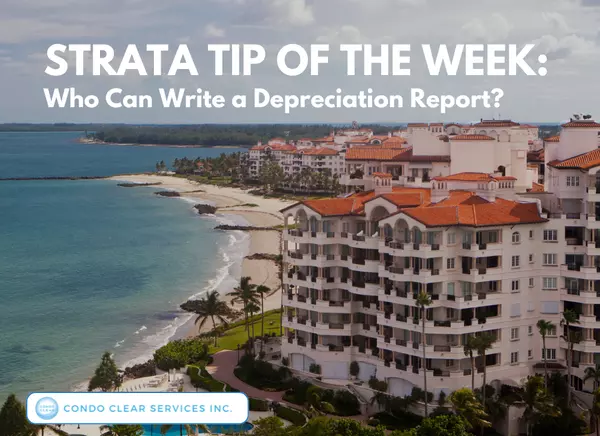
Strata Tip of the Week - Who Can Write a Depreciation Report?
If you’ve read our previous email titled “Not All Depreciation Reports Are Created Equal”, you’ll know that evaluating the quality of a depreciation report is key to identifying shortcomings and avoiding potential pitfalls when assisting consumers purchasing strata-titled properties. As of July 1, 2
Read More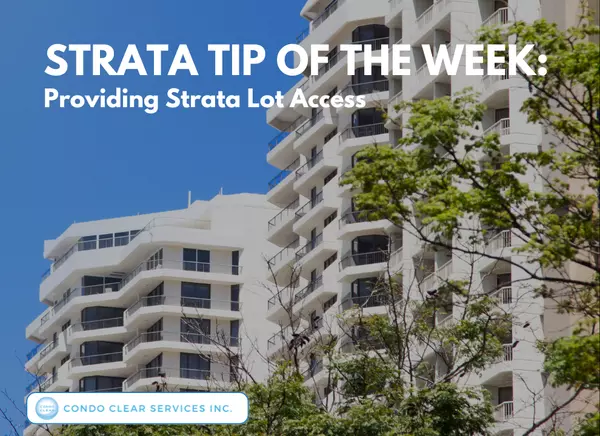
Strata Tip of the Week - Providing Strata Lot Access
Strata corporations are allowed to access various areas of a property when needed in order to carry out their responsibilities. For example: If a limited common property patio is assigned to a strata lot and repairs are required, the strata can request access from the owner to complete the work. If
Read More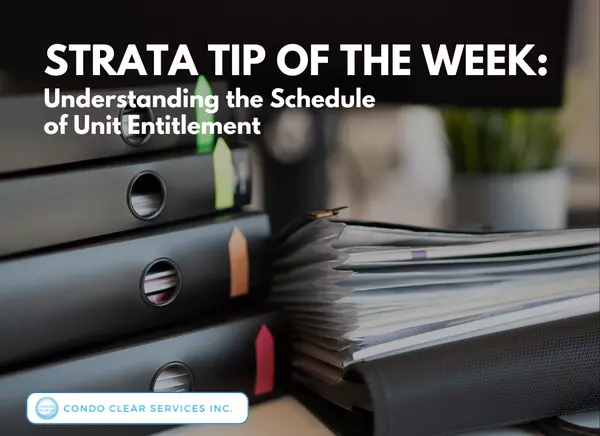
Strata Tip of the Week - Understanding the Schedule of Unit Entitlement
1. What Is a Schedule of Unit Entitlement? In BC, the Schedule of Unit Entitlement is a numerical table which determines two important things for each strata lot: A. The share of common property and common assets that each strata lot owns, and B. The proportion of common expenses that each strata lo
Read More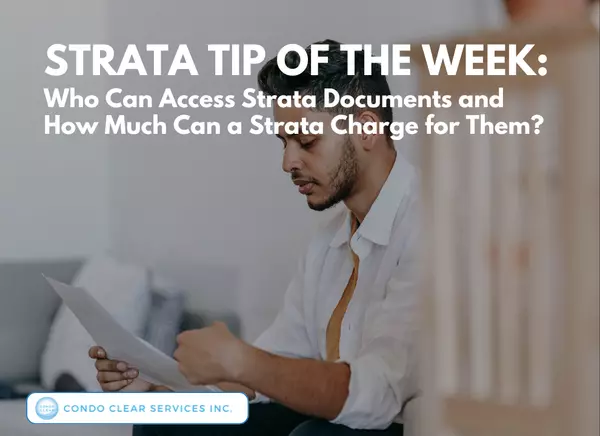
Strata Tip of the Week - Who Can Access Strata Documents and How Much Can a Strata Charge for Them?
Obtaining complete and current documents from strata corporations or their management companies is one of the biggest challenges we run into when working on strata document reviews for buyers and Realtors. That’s why it’s important to understand who can request strata documents and how much the stra
Read More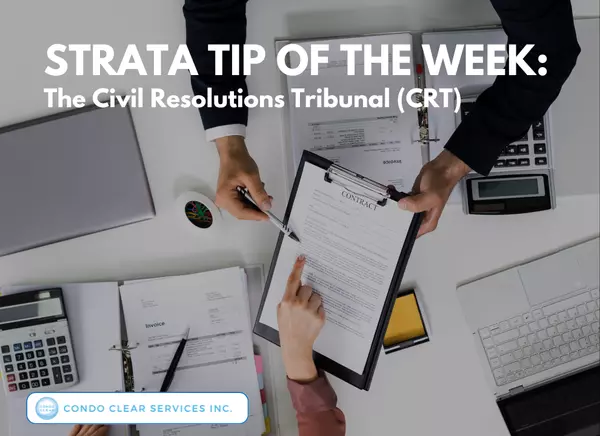
Strata Tip of the Week - The Civil Resolutions Tribunal (CRT)
1. What is the Civil Resolutions Tribunal? The Civil Resolutions Tribunal (CRT) is an online tribunal in British Columbia that helps address issues involving strata corporations, small claims, and other matters without needing to go to court. Since it was introduced in 2016, it has made it much easi
Read More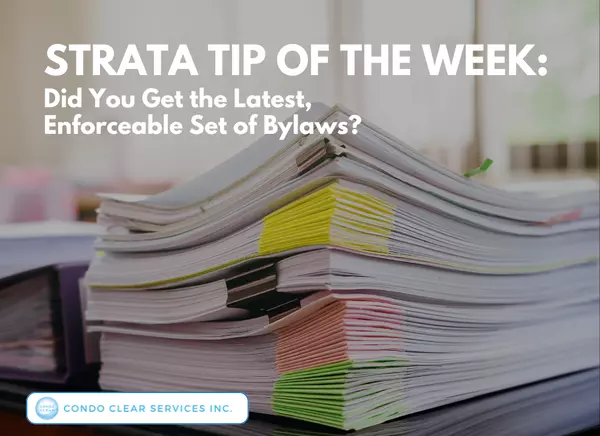
Strata Tip of the Week - Did You Get the Latest, Enforceable Set of Bylaws?
Based on our experience, approximately 25% of strata corporations, or their management companies, don’t provide the most recent set of bylaws. Here’s how to make sure you’ve got the latest, enforceable version. 1. Where can I find the strata corporation’s bylaws? All strata corporations in BC shou
Read More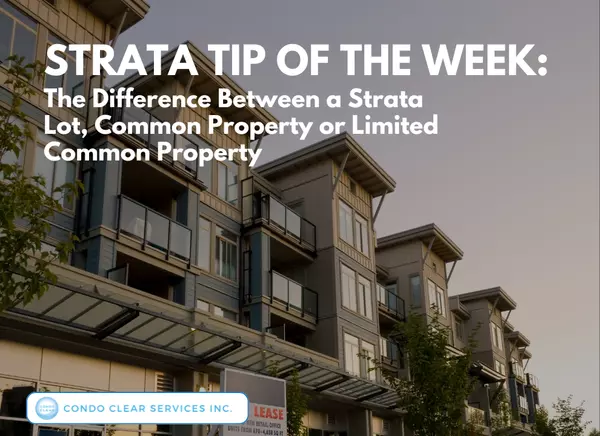
Strata Tip of the Week - The Difference Between a Strata Lot, Common Property or Limited Common Property
We often get questions about the difference between a strata lot, common property, and limited common property, so here it is: In British Columbia, land registered at the Land Title Office can be subdivided in different ways. One of these is a “strata subdivision,” which is different from the “tra
Read More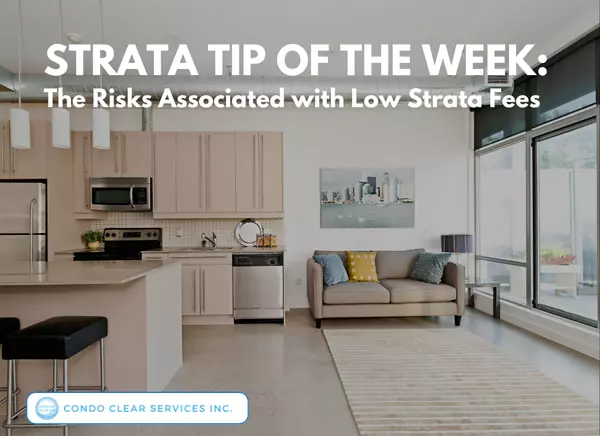
Strata Tip of the Week - The Risks Associated with Low Strata Fees
It’s important for strata corporations to be fiscally responsible. However, strata corporations whose main focus is keeping strata fees as low as possible can, at times, make decisions that lead to low strata fees in the short term, but significantly higher costs to owners in the long term. Here are
Read More
Strata Tip of the Week - In-Unit Hot Water Tanks
Some strata buildings have one or more central hot water tanks that supply all the units, while others are designed with individual hot water tanks located inside each unit. When a tank is located in the unit: 1. It typically only services that unit. 2. It’s usually considered part of the strata l
Read More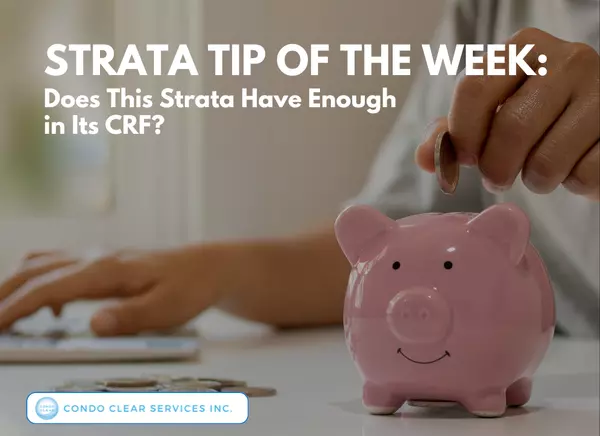
Strata Tip of the Week - Does This Strata Have Enough in Its CRF?
One of the most common questions we get from buyers when reviewing strata corporations is: Does this strata have “enough” in its Contingency Reserve Fund (CRF)? It’s a straightforward question, but the answer can vary significantly depending on what’s being asked. To get a clearer picture, it’s help
Read More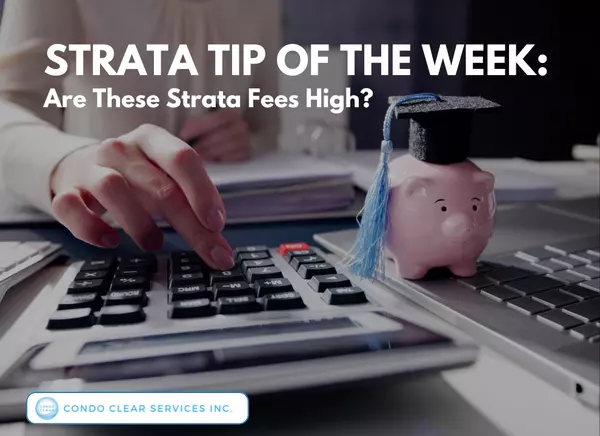
Strata Tip of the Week - Are These Strata Fees High?
A common question we hear from buyers is: “Are these strata fees high?” At first glance, it might seem like a straightforward question, but the answer isn’t always simple. Whether strata fees are “high” depends on what they include and what you’re comparing them to. If you’ve read our previous email
Read More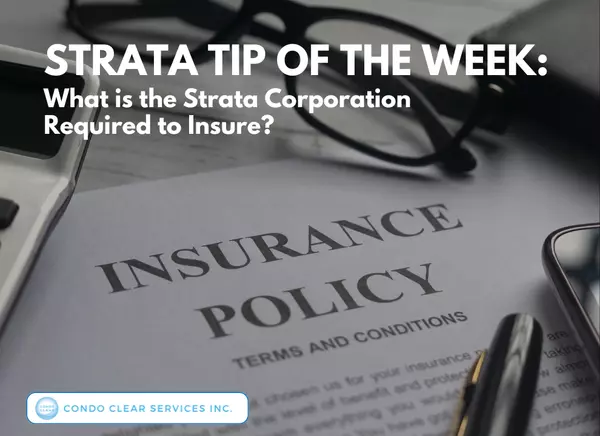
Strata Tip of the Week - What is the Strata Corporation Required to Insure?
All strata corporations in BC, regardless of size, must obtain property and liability insurance, including bare land strata corporations and strata-titled duplexes. 1. Property Insurance A. The strata corporation’s property insurance must be for: Common property Common assets Buildings shown on th
Read More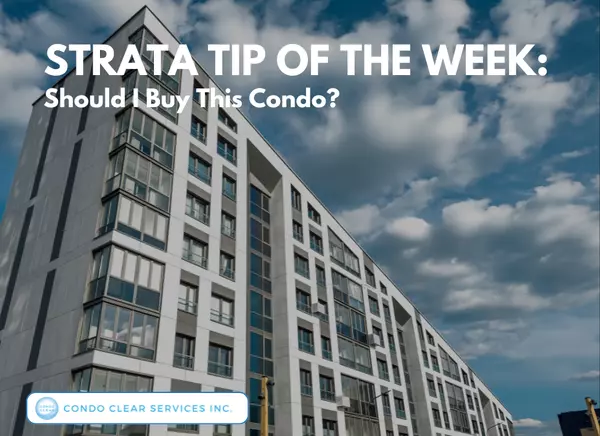
Strata Tip of the Week - Should I Buy This Condo?
One of the most common questions buyers ask us when getting a strata documents review is, "Should I buy this condo?", or some variation of it. It is a fair question, but the answer is not as straightforward as many hope. There is no such thing as a condo that is objectively good or bad. The decisi
Read More
Strata Tip of the Week - Strata Leaks: What Buyers Should Watch For
Purchasing a unit in a strata corporation with a history of leaks and water-related issues can carry cartain risks. However, leaks are among the most common problem in strata developments, so it’s important to evaluate not just the number of leaks reported, but also their sources and how the strata
Read More